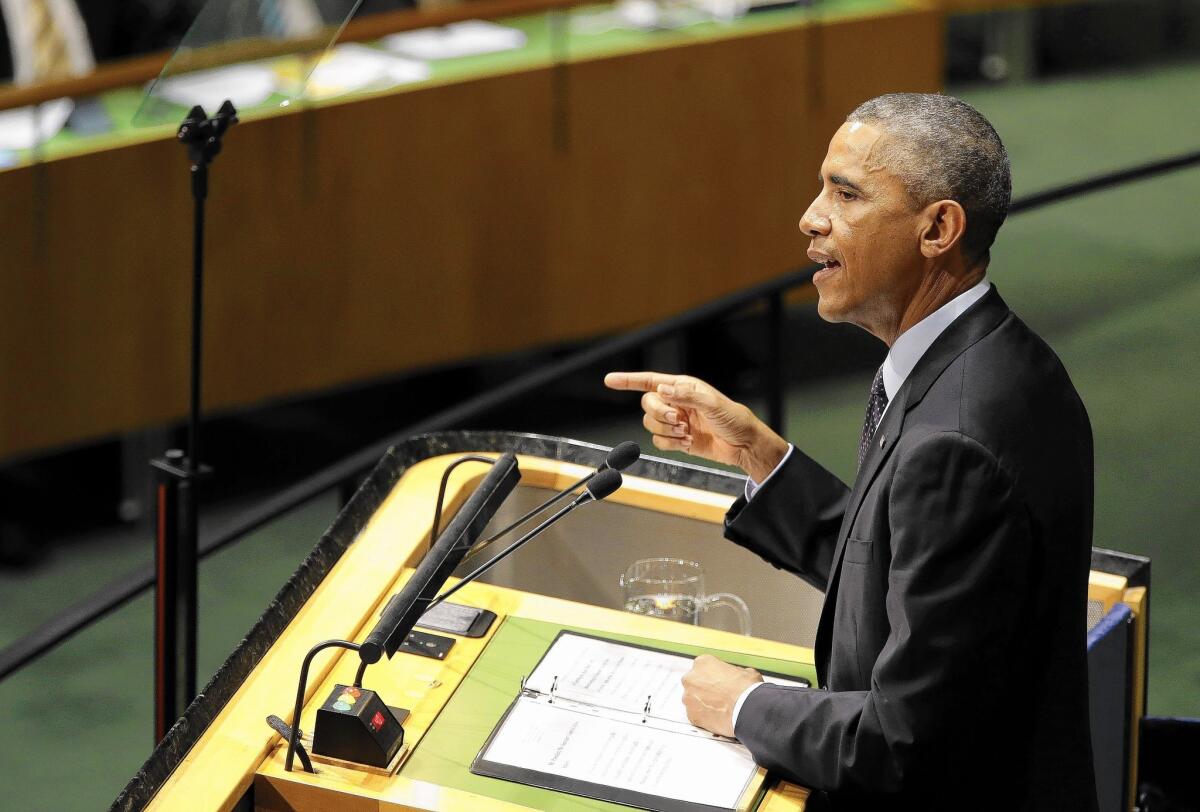U.S. and China announce plans to curb greenhouse gases

- Share via
Reporting from UNITED NATIONS — At a summit Tuesday to kick off the drafting of an international climate change accord, President Obama spoke bluntly of American responsibility for global warming and pledged that ambitious steps would be unveiled over the next year to cut greenhouse gas emissions.
Obama was followed by Chinese Vice Premier Zhang Gaoli, who said that China would put forth a plan in early 2015 to reach a peak in its greenhouse gases “as soon as possible” and scale back emissions thereafter.
The announcements by leaders of the two top emitters of greenhouse gases fed a cautious optimism among many observers that after decades of limited action, the international community is moving to take meaningful steps to address climate change.
“I don’t like to defend the U.S. administration’s climate policy, and there’s still a lot to be done,” said Michael Brune, executive director of the Sierra Club, “but what I heard the president say today was that we need to lead.”
The U.N. Climate Summit is intended to be a launching pad for an international agreement that would reduce global emissions and soften the predicted blows, both environmentally and financially, from climate change. Negotiators aim to adopt an agreement in Paris next year.
In brief remarks, the president acknowledged the many crises facing world leaders, but argued that none would match the potential damage of the rising temperatures already fueling extreme drought, hurricanes and wildfires around the globe.
“There’s one issue that will define the contours of this century more than any other,” Obama said. “That is the urgent and growing threat of a changing climate.”
Obama spelled out how the United States was already leading the effort to cut emissions, most notably by introducing new rules to boost vehicle fuel economy and curtail greenhouse gases from power plants.
The president called for more aggressive steps to address global warming from developing nations whose recent, rapid growth has exacerbated the problem, and from industrialized economies, whose growth in the last century created it.
“We recognize our role in creating this problem. We embrace responsibility to help combat it,” Obama said. “Nobody gets a pass.”
Obama’s acceptance of American responsibility for driving global warming was blunter than in the past — and welcomed by the majority of countries in attendance, many of which generate few emissions but have already begun to suffer the effects of climate change.
He drew applause after he mentioned that he had met with Zhang just before taking the stage to reiterate “my belief that as the two largest economies and emitters in the world, we have a special responsibility to lead. That’s what big nations have to do.”
The summit was held against the backdrop of an all-time high for global emissions of heat-trapping greenhouse gas. On Sunday, scientists announced that the world’s emissions had grown 2.3% last year to 39.8 billion tons — their highest level ever — largely because of China, the U.S. and India.
Zhang was the highest-ranking Chinese official so far to speak of China’s plan to reduce its reliance on fossil fuels, allowing his nation’s greenhouse gas emissions to peak sooner rather than later.
“China’s remarks at the climate summit go further than ever before,” said Jennifer Morgan, director of climate and energy programs at the World Resources Institute. “The strong back-to-back statements by the two largest emitters send a clear signal that both countries will work seriously to put in place climate solutions domestically and reach an ambitious international agreement in Paris next year.”
Participants and activists understood that the U.N. summit would not produce detailed, far-reaching announcements by the biggest polluters about how much they would curb greenhouse gases. Those targets are expected early next year. Still, initiatives introduced at the summit by coalitions of countries, businesses and activists showed a growing willingness to address major drivers of climate change, such as deforestation and oil and gas development.
The Obama administration introduced two modest international programs: a new executive order that requires U.S. federal agencies to consider climate resilience in international development work and investments, and an initiative among U.S. agencies to make data used in predicting weather shifts more easily available to developing nations.
Developing nations appreciated the support, but funding for the projects must still be found, said Alden Meyer, director of strategy and policy for the Union of Concerned Scientists. Now that the Americans and Chinese have sketched out their broad vision, the rest of the world will be watching for the emissions cuts and timetables they propose over the next 16 months, he said.
“At the summit, the two biggest emitters were setting the table rather than providing the main course,” Meyer said, “and they recognize that next year, they will have to provide a substantial meal. They can’t offer up an appetizer and expect people to be happy.”
kathleen.hennessey@latimes.com
More to Read
Sign up for Essential California
The most important California stories and recommendations in your inbox every morning.
You may occasionally receive promotional content from the Los Angeles Times.












